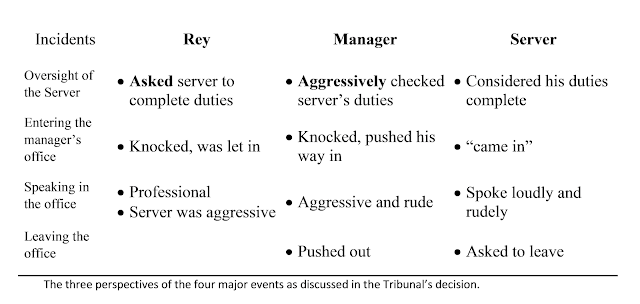The Fired "Rude" Waiter Was Not "Just French"
Stereotypes form harmful boxes for containing entire peoples, but some can establish a chicken-and-egg relationship when paired with observation bias. The waiters of Paris have a peculiar stereotype that is as flattering as it is problematic: Apparently, Parisian waiters perform seriously and with pride; so much so that this sense of authority translates as disrespect to the uninitiated. This stereotype has proven so pervasively true that it has inspired a corrective campaign by the Parisian board of tourism and chamber of commerce, as well as a psychological condition wherein Japanese tourists suffer culture shock when confronted by rude Parisians.
The stereotype of a haughty French waiter collides with another stereotype in the case of Guillaume Rey, a Paris-trained waiter who was fired from a Toronto restaurant for rude behavior: The overly-serious French waiter was fired for clashing with overly-polite Canadian coworkers. Rey claims that his termination in August 2017 was based in discrimination against his French heritage, and has filed a human rights complaint with the British Columbia Human Rights Tribunal. The parent company of the restaurant filed a motion to dismiss Rey’s claim, and it is the Tribunal’s decision to reject that dismissal that is the main source of information on this case. The details in the Tribunal’s decision suggest that Rey believes he was discriminated against for his French personality; and in the hearing, he will have to prove it. The Tribunal documentation cites the perspectives of both Rey and restaurant representatives, so contradictions are plentiful. Regardless, some of the concurring points are worth exploring under analyses of Politeness Theory.
Rey considers his personality professional and honest, but his former coworkers complained that he was aggressive and disrespectful. He asserts that the accusations originated in perceptions about French culture, which “tends to be more direct and expressive,” and that his French wait training taught him higher standards. Rey’s competence as a waiter was never questioned; customers never complained about him, and his reviews state that he was professional and even friendly with his guests. Rey was often appointed “shift lead,” a type of manager among his waiter-peers. It was during one such shift that Rey supposedly berated one staff member “to the point of tears” which got him fired. Documentation establishes that the offending incident occurred because Rey was checking on one server’s completion of his assigned duties; the server says Rey was “aggressively” checking on him, while Rey states that he was only asking. In response, the server went into the manager’s office to complain about Rey’s behavior. All parties agree that Rey knocked on the door, but their perspectives diverge immediately after the manager opens the office door.
Divergence in statements like this are to be expected when those giving them know that their statements may go to court, but for this post, we will simply look at some of these events as failures in satisfying some maxims of cooperative communication. Of the events, we will consider the two events that stand out as agonistic; 1) Rey’s oversight of the server, and 2) the conversation had within the manager’s office. The rest we will have to dismiss as inconclusively questionable. The following analyses are highly conjectured, and based on projections of my own experiences and subsequent interpretations of events.
By using Brown and Levinson’s theories of Face to analyze Rey’s oversight of the server, it could appear to have been a Face Threatening Act that threatened the Faces of both Rey and the server. Rey says that he was doing his job as shift lead and checking that the server’s duties were being completed. In this setting, Rey is in a position of (at least nominal) leadership, and the server is his subordinate. If this restaurant's staff leadership practices resemble the American ones I am familiar with, then the role of “shift lead” is temporary, and does not truly elevate one coworker above another. Perhaps Rey was unaware of the nominal nature of shift lead; perhaps his Parisian training taught him that this position changed his status among his colleagues, and his Canadian coworker disagreed. If this were so, then the Face Threats occurred as two people spoke to each other under different perspectives of each other’s social positions: Rey believed he was managing a subordinate; the Canadian server believed he was being hassled by a peer. If we believe this to be the case, the server’s Positive Face would be damaged by Rey’s assumed lack of deference, and Rey’s Negative Face was threatened by the server’s lack of deference.
The second event to consider is the conversation that occurred within the manager’s office. However he entered the manager’s office, the manager and server both agree that Rey was rude. However, Rey insists that he was carefully professional in his language; he is quoted as saying he was “especially cautious of agitating or engaging with” the server, and supplied a witness’s letter that supports him. The server says that Rey berated him for not “checking out with” Rey, which could mean that the server went to the manager without first notifying anyone; Rey seems to have perceived this as abandoning his duties. If Rey entered the manager’s office as a superior corralling an errant subordinate, he did so in the presence of a self-identified peer and an actual superior; both of whom seem to share a perspective on Rey’s peer status and both interpreted Rey’s speech act as aggressive.
The instigating factor in this case seems to be Rey’s perception of his role, as informed by his Parisian-style training as a server. The manager said that Rey “has a completely different view of the reasons for his termination”, and in that, I believe they are correct far more than they know. However, as Rey will have to convince the Tribunal, the question of discrimination is whether or not Rey’s perceived rudeness is the same as his French heritage. After this softly academic analysis, I have to venture to say that they are not exactly one in the same. Even some parts of the French government have concerns about Parisian manners; the Parisian chamber of commerce and Paris tourism board collaborated in a 2013 campaign to encourage more polite behavior from (among others) Parisian waiters, especially to foreign visitors. So perhaps Rey is accurately representing his Parisian wait training, but not so fairly French behavior in general.
Finally, it must be noted that Rey contends that it is his French heritage, which he said “tends to be more direct and expressive” and perspectives of that culture as aggressive, that led to his unfair termination. He argues that his personality, as informed by his French culture, which is “direct, honest and professional”, suffered from the same prejudice. He cites comments about his French-ness from managers, but management cites performance reviews that document Rey’s behavior as, on occasion, combative and aggressive. If it could be proven that Rey’s behaviors were misconstrued because of language barriers, such as the loss of linguistic features that might mark deference, hedging, presupposition, etc., Rey could possibly make a case for his perspective. However, very little linguistic evidence is available to me at this time.
To conclude, I must end on the personal note that I, too, have often been accused of being overly direct, aggressive, and even rude. These accusations have happened when I was a waiter, but also in other roles and jobs. Alas, I am not French, nor of Parisian education. I do feel for Guillaume Rey, but unless he can convince the British Columbia Human Rights Tribunal that to be French is to be “rude”, he should defend himself by blaming the failed transmissions of pragmalinguistic and sociopragmatic politeness maxims between languages and cultures. As of writing, the Tribunal has not published any subsequent documentation regarding Rey's case, leading me to believe it has not yet gone to hearing.


Comments
Post a Comment